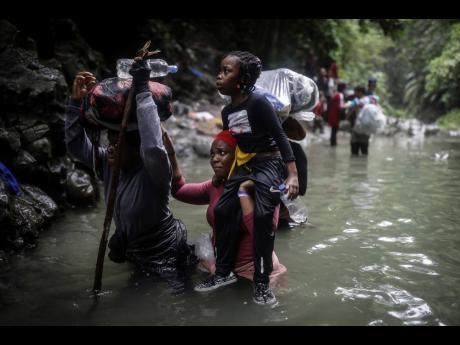Editorial | Haiti group has template
In appointing an eminent persons group on Haiti, the Caribbean Community (CARICOM) has, on the face of it, done what this newspaper recently urged on Prime Minister Andrew Holness, that he name his own special envoy to Jamaica’s neighbour to the northeast.
This newspaper nonetheless welcomes the development, especially if it implies that CARICOM is committed to a long-term effort to help Haiti overcome its immediate crisis and build the foundations for enduring political stability.
In this regard, CARICOM should provide further and better particulars on the group’s terms of reference, beyond the broad outlines so far given. While we previously advised CARICOM of the dangers of Haiti fatigue, this is hardly likely to be a concern only of the international community, whose periodic interventions in the Caribbean country have brought neither sustained stability nor economic development. There is a possibility, too, of Haitians becoming fed up of outsiders, even those from nearby and with whom they can relate, telling them what they need to do. They might, in the circumstance, stop listening.
CARICOM’s three-member team, in this regard, starts with an advantage. They have all been prime ministers – Bruce Golding, Jamaica; Perry Christie, The Bahamas; and Kenny Anthony, St Lucia – with knowledge of Haiti’s situation and experience in manoeuvring delicate political situations. And as elder statesmen who have themselves held high office, they can talk frankly to the people with whom they to engage, including the leaders of CARICOM.
IS NOT CLEAR
But precisely what CARICOM’s leaders expect them to deliver is not clear.
“The group will initiate and oversee the community’s provision of good offices support in designated priority areas, including security, governance, the electoral process, and long-term development planning and advocacy,” A CARICOM statement said,“They will also liaise with key international partners and agencies.”
In other words, are the eminent persons expected, through the region’s leaders, only to offer broad advice to Haitian stakeholders on the matters on their agenda, or go deeper and become more specific on the programmes to which CARICOM would, insofar as possible, commit longer-term technical or other support.
As we previously argued, th latter is this newspaper’s preference. Implicit in this approach is CARICOM assuming global advocacy and leadership of the Haiti support agenda, notwithstanding the obvious limits of the community’s economic and manpower resources to commit to the project.
There are good, and obvious, reasons for CARICOM to be at the forefront of the project. Rather, it is a profoundly moral obligation.
First is the question of trust, or overcoming the Haitian side of the fatigue, being tired of powerful outsiders instructing them on how to fix their problems, while seeming always to leave with nearly as much as they bring.
In that regard, CARICOM, of which Haiti is a member, is not merely a non-threatening force. Rather, shared history and backgrounds create the basis of common identity between Haitians and most CARICOM citizens, kith and kin.
SOURCE OF INSECURITY
Further, instability in Haiti is a potential source of insecurity for its neighbours, especially those next door in the northern Caribbean.
Additionally, as the UN’s secretary general, António Guterres, alluded to during his recent visit to Jamaica, powerful countries are not exactly jostling to be at the helm of the Haiti project. Even for those in the neighbourhood, Haiti, at this time, is not on the geopolitical front burner. Their attention is taken elsewhere.
But even as CARICOM is expected to direct the heavy lifting, it is appreciated that it cannot do it alone and will require help. CARICOM and Haiti need their international partners in helping to re-establish domestic security; smoothing the path for a return to democracy, while shoring up the institutions of the state, and creating the basis for growth and development. Indeed, as a starting point, CARICOM should formally place the Haiti issue squarely on the table of the Organization of American States, making it clear that it is also a hemispheric issue.
The bottom line is not reinventing the wheel. In some respects, the eminent persons group has the template of the prime ministerial special envoy to, as well as CARICOM’s task force on Haiti during the 2004 crisis, when President Jean-Bertrand Aristide was the victim of putsch.
The work of the Trinidad and Tobago diplomat, Reggie Dumas, as Kofi Annan’s envoy/adviser on Haiti during that same crisis would still be useful. Moreover, much of what Mr Annan presented to the Security Council in 2004 remains relevant nearly two decades later.
How the process is led requires updating.

